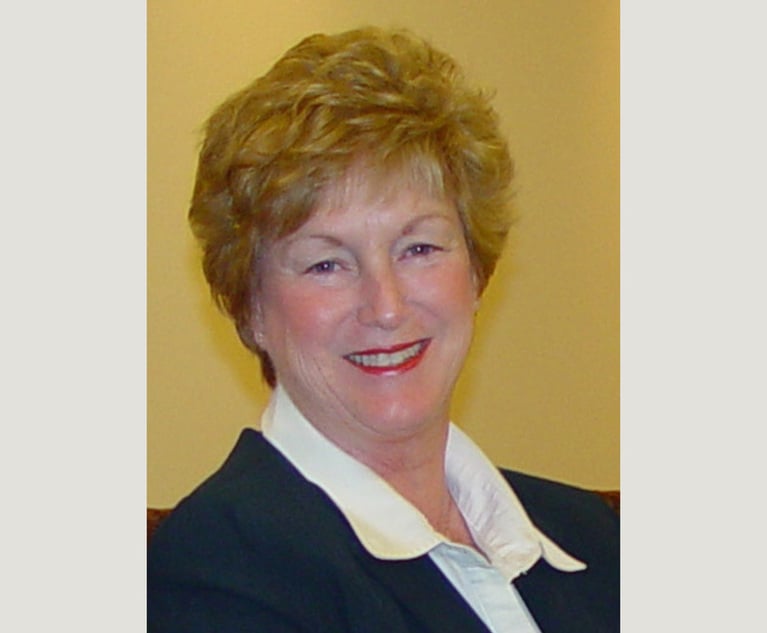Temptation of Taking on Marijuana Clients Comes With Stern Word of Caution
The sale or use of marijuana is a crime. Connecticut residency doesn't immunize a person from potential federal prosecution. And for lawyers the lesson is that it's our obligation to follow the rule of law, or risk the consequences for failing to do so.
January 26, 2018 at 11:22 AM
4 minute read

Connecticut state officials started to participate in the marijuana trade two years ago, when the Department of Consumer Protection began accepting fees for lucrative licenses to operate dispensary facilities pursuant to newly enacted legislation. Law firms counseled the businesses that sought to engage in the sale of marijuana as was authorized by state law.
At the time, we cautioned lawyers and the public from getting involved in the marijuana trade, regardless of the state's new legislation (“Marijuana and the Rule of Law,” Connecticut Law Tribune, April 8, 2014). We explained that there remained no question that marijuana's “sale or use is flatly illegal under federal statutory law. The Controlled Substances Act, which was adopted by Congress in 1970, creates five tiers of restricted drugs. Marijuana is currently classified by the federal government as a Schedule I drug, which makes its possession a violation of federal law. The federal ban on marijuana has been upheld as a valid use of Congress's interstate commerce power by two decisions of the U.S. Supreme Court — United States v. Oakland Cannabis Buyers' Cooperative in 2001 and Gonzales v. Raich in 2005.” We opined that lawyers should not ignore the federal law, even if the state Legislature and state Department of Consumer Protection were doing so, but rather they should seek to change it if they believed that the law was imprudent. Nonetheless, the sale of marijuana has continued as a state-sanctioned trade, all with the help of lawyers.
At the beginning of the year, the U.S. Department of Justice explained that, even if the prior administration did not enforce the federal law, the new administration would. Nothing changed in the law. All that changed was a memo by U.S. Attorney General Jeff Sessions rescinding “the Cole memo,” which had discouraged federal drug prosecutions where the conduct was legalized by state law. The attorney general's 2018 memo makes clear that those who have broken federal law are subject to federal criminal prosecution, regardless of whether state officials approve of their conduct.
Newly appointed U.S. Attorney John Durham now has the authority to prosecute businesses that entered the marijuana trade and those lawyers who, as arguably co-conspirators, helped them to do so. He can prosecute marijuana lawyers with the same vigor that the DOJ prosecuted attorneys during its mortgage fraud crackdown under the prior two administrations. We ask him to refrain. While lawyers would have done better to heed our advice from two years ago, it would be unfair to pursue prosecutions for conduct that was then permitted under state law and was at least tolerated by federal officials.
However, to the lawyers involved in the trade, the Sessions memo is a wake-up call. We say it again, as we said it 2014, you cannot simply disregard a federal criminal law because you disagree with it. Your remedy is to urge Congress and the attorney general to declassify marijuana from its list of Schedule I drugs so that its possession would no longer be barred by federal law or to use the power of their vote to elect federal leaders who will change the federal law.
The sale or use of marijuana is a crime. Connecticut residency doesn't immunize a person from potential federal prosecution. U.S. Attorney Durham should give corporations and their lawyers the opportunity to cease any present marijuana-related activities. Prosecutions should look forward, not backward. And lawyers should walk away with the lesson that it is our obligation to follow the rule of law, or risk the consequences for failing to do so.
This content has been archived. It is available through our partners, LexisNexis® and Bloomberg Law.
To view this content, please continue to their sites.
Not a Lexis Subscriber?
Subscribe Now
Not a Bloomberg Law Subscriber?
Subscribe Now
NOT FOR REPRINT
© 2025 ALM Global, LLC, All Rights Reserved. Request academic re-use from www.copyright.com. All other uses, submit a request to [email protected]. For more information visit Asset & Logo Licensing.
You Might Like
View All


Trending Stories
Who Got The Work
Michael G. Bongiorno, Andrew Scott Dulberg and Elizabeth E. Driscoll from Wilmer Cutler Pickering Hale and Dorr have stepped in to represent Symbotic Inc., an A.I.-enabled technology platform that focuses on increasing supply chain efficiency, and other defendants in a pending shareholder derivative lawsuit. The case, filed Oct. 2 in Massachusetts District Court by the Brown Law Firm on behalf of Stephen Austen, accuses certain officers and directors of misleading investors in regard to Symbotic's potential for margin growth by failing to disclose that the company was not equipped to timely deploy its systems or manage expenses through project delays. The case, assigned to U.S. District Judge Nathaniel M. Gorton, is 1:24-cv-12522, Austen v. Cohen et al.
Who Got The Work
Edmund Polubinski and Marie Killmond of Davis Polk & Wardwell have entered appearances for data platform software development company MongoDB and other defendants in a pending shareholder derivative lawsuit. The action, filed Oct. 7 in New York Southern District Court by the Brown Law Firm, accuses the company's directors and/or officers of falsely expressing confidence in the company’s restructuring of its sales incentive plan and downplaying the severity of decreases in its upfront commitments. The case is 1:24-cv-07594, Roy v. Ittycheria et al.
Who Got The Work
Amy O. Bruchs and Kurt F. Ellison of Michael Best & Friedrich have entered appearances for Epic Systems Corp. in a pending employment discrimination lawsuit. The suit was filed Sept. 7 in Wisconsin Western District Court by Levine Eisberner LLC and Siri & Glimstad on behalf of a project manager who claims that he was wrongfully terminated after applying for a religious exemption to the defendant's COVID-19 vaccine mandate. The case, assigned to U.S. Magistrate Judge Anita Marie Boor, is 3:24-cv-00630, Secker, Nathan v. Epic Systems Corporation.
Who Got The Work
David X. Sullivan, Thomas J. Finn and Gregory A. Hall from McCarter & English have entered appearances for Sunrun Installation Services in a pending civil rights lawsuit. The complaint was filed Sept. 4 in Connecticut District Court by attorney Robert M. Berke on behalf of former employee George Edward Steins, who was arrested and charged with employing an unregistered home improvement salesperson. The complaint alleges that had Sunrun informed the Connecticut Department of Consumer Protection that the plaintiff's employment had ended in 2017 and that he no longer held Sunrun's home improvement contractor license, he would not have been hit with charges, which were dismissed in May 2024. The case, assigned to U.S. District Judge Jeffrey A. Meyer, is 3:24-cv-01423, Steins v. Sunrun, Inc. et al.
Who Got The Work
Greenberg Traurig shareholder Joshua L. Raskin has entered an appearance for boohoo.com UK Ltd. in a pending patent infringement lawsuit. The suit, filed Sept. 3 in Texas Eastern District Court by Rozier Hardt McDonough on behalf of Alto Dynamics, asserts five patents related to an online shopping platform. The case, assigned to U.S. District Judge Rodney Gilstrap, is 2:24-cv-00719, Alto Dynamics, LLC v. boohoo.com UK Limited.
Featured Firms
Law Offices of Gary Martin Hays & Associates, P.C.
(470) 294-1674
Law Offices of Mark E. Salomone
(857) 444-6468
Smith & Hassler
(713) 739-1250











